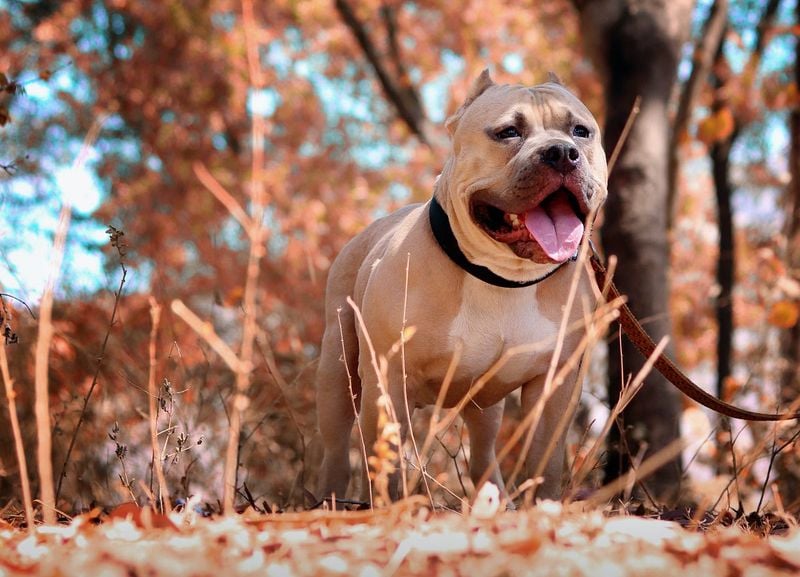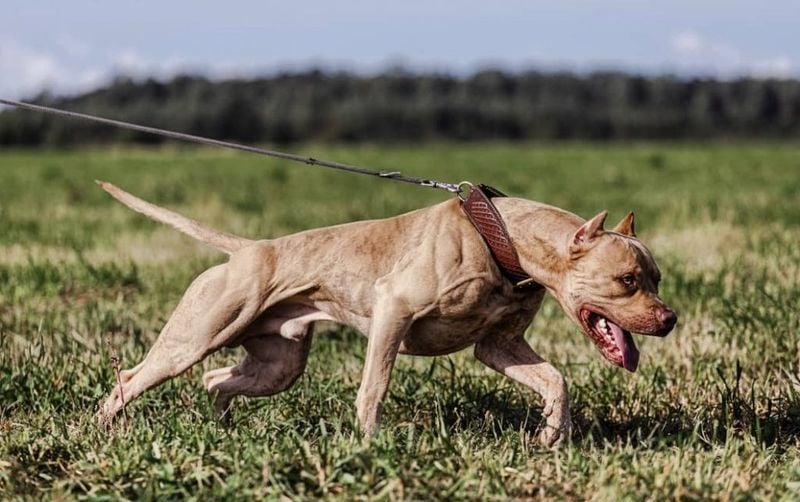17 Brutally Honest Reasons You Shouldn’t Adopt a Pit Bull
Let’s get one thing straight: Pit Bulls aren’t monsters. They’re not born dangerous, nor do they inherently deserve the bad reputation that follows them.
In fact, many Pit Bull owners will tell you they’re among the most loyal, affectionate dogs out there. But that doesn’t mean they’re the right dog for everyone.
Adopting a Pit Bull comes with a unique set of challenges, responsibilities, and—let’s be honest—some pretty serious societal baggage. This isn’t about bashing the breed; it’s about being real with potential adopters.
The truth is, too many people bring home a Pit Bull without fully understanding what that means.
They’re drawn to the breed’s muscular frame or heart-melting puppy eyes, but they’re not prepared for the training, commitment, or scrutiny that comes with it.
And when things get tough, the dog often pays the price. This article isn’t here to scare you—it’s here to prepare you. Because while love and good intentions are a start, they’re not enough to set up a Pit Bull for success.
These dogs need structure, leadership, and a home that understands the risks along with the rewards. If you’re thinking about adopting a Pit Bull, you deserve to know the full story.
That means acknowledging not just the potential for deep companionship, but also the legal, social, and behavioral hurdles you might face. It means asking yourself some tough questions before making a life-altering decision.
So, before you fall in love with that blocky head and goofy grin, take a step back.
Look beyond the adorable exterior and understand what truly comes with adopting a Pit Bull. Because when it comes to this breed, the stakes are simply too high for wishful thinking.
1. Breed-Specific Legislation
Many cities and countries have laws that ban or restrict Pit Bulls. Such regulations can significantly limit your housing and travel options, creating constant legal worries.
Imagine planning a family vacation only to discover that your furry friend isn’t welcome.
While some areas may allow Pit Bulls under specific conditions, these often come with hefty insurance requirements and mandatory muzzling in public. The stress of navigating these laws can take the joy out of pet ownership.
Legal battles and fines can quickly add up, making this a costly concern. Ensuring compliance requires staying updated on local laws, which can change unexpectedly.
2. Housing Restrictions
Finding a place to live with a Pitbull can feel like searching for a needle in a haystack. Landlords and homeowners associations often have strict no-Pitbull policies, even if your dog is a model citizen.
These restrictions mean fewer housing options, and you might have to settle for a less-than-ideal living situation. Imagine the frustration of falling in love with a perfect apartment, only to be rejected because of your pet.
Even when Pitbulls are allowed, expect to pay higher security deposits or additional pet fees. Such financial burdens and limitations can make renting a home an exhausting endeavor.
3. Insurance Issues
Owning a Pitbull might increase your household insurance premiums significantly. Some providers outright deny coverage if you own this breed, placing you in a stressful bind.
Imagine receiving a policy renewal notice and finding your rates have skyrocketed just because of your furry companion. In some cases, home insurance may be canceled altogether.
This leaves owners scrambling to find a provider that accommodates Pitbulls without exorbitant fees. The constant worry about coverage and costs can be a frustrating part of owning one of these dogs.
4. Strong Prey Drive
The strong prey drive in Pitbulls makes them instinctually chase small animals. If you have a household with cats or smaller pets, this can be a significant concern.
Even during routine walks, a sighting of a squirrel or rabbit can lead to sudden lunges and strained leashes. This behavior requires vigilance and strong leash training to manage.
For owners who love visiting dog parks, the high prey drive can result in unforeseen aggressive interactions with smaller dogs. Such incidents can strain social outings and require constant supervision.
5. Misunderstood Behavior
Misinterpreting a Pitbull’s body language can lead to unexpected situations. What seems like playful bouncing might quickly escalate, catching owners off guard.
These dogs often communicate with subtle gestures that need careful observation. An innocent encounter can sometimes be misread by others, leading to conflicts at dog parks.
Understanding these cues is crucial in preventing misunderstandings and ensuring safe play.
Adequate training in canine behavior is as essential as a good leash. Learning to read these signals helps in fostering a harmonious environment for both pets and their owners.
6. Dog Aggression
Dog aggression remains a challenging trait for many Pitbull owners. Historically bred for fighting, these dogs can show reactivity towards other canines, regardless of upbringing.
Imagine a calm walk turning into a tense encounter, as a passing dog triggers your Pitbull’s instincts. Even with proper socialization, unexpected aggression can surface, especially towards the same gender.
Addressing this requires consistent training and possibly professional help. Such reactivity can limit social opportunities and demands constant vigilance in mixed-dog settings.
7. Social Stigma
Walking a Pitbull can sometimes feel like wearing a scarlet letter. People often have preconceived notions, leading to judgmental stares and whispered comments.
This social stigma can affect friendships and family dynamics. It’s heartbreaking to see others cross the street or avoid interaction based purely on your dog’s appearance.
Even if your Pitbull is well-trained and gentle, overcoming negative stereotypes remains a constant battle. Advocacy and education can help, but the emotional toll can be wearing for any dedicated owner.
8. Training Is Not Optional
Training a Pitbull is not just recommended; it’s essential. These dogs require structured, consistent training from the very start. Without it, they might become a serious liability.
Imagine dealing with a stubborn streak in a powerful breed that can make training both challenging and rewarding. Early intervention is key to fostering a well-behaved pet.
Professional training can be costly, but it’s a worthwhile investment. Owners must commit to continuous education and reinforcement to manage this breed’s strong will effectively.
9. Powerful Build
Pitbulls possess a powerful build that can surprise even seasoned dog owners. Their muscular bodies mean that if a Pitbull decides to pull or lunge, controlling them can be a workout.
This strength requires the owner to be equally prepared with strong leashes and harnesses. Imagine a leisurely walk turned into a tug-of-war match, testing your physical endurance.
Managing such strength demands training and physical readiness to prevent potential accidents. Owners need to be vigilant and prepared for unexpected bursts of energy that could catch them off guard.
10. High Energy Needs
Pitbulls are bundles of energy, always ready for action. Failing to meet their exercise needs can lead to frustration and destructive behavior.
Imagine coming home to chewed furniture because your Pitbull’s energy wasn’t spent. They thrive on vigorous daily activities and mental stimulation to stay content.
Regular exercise not only keeps them happy but helps in managing their behavior. Owners must dedicate time each day to ensure their Pitbulls remain active and entertained, turning this responsibility into a rewarding routine.
11. Injury Risks in Fights
Pitbulls’ bite strength can cause serious injuries if they get into a dog fight. While they may be loving family members, altercations with other animals can turn severe quickly.
Imagine trying to break up a fight and facing potential harm, both for the dogs and yourself. Their persistence in such situations requires immediate intervention.
This risk necessitates owners to be proactive in preventing fights by understanding triggers and avoiding hotspots. Proper socialization and precautions can minimize these incidents, keeping both pets and people safe from harm.
12. Vet and Daycare Discrimination
Finding care for a Pitbull can be a frustrating endeavor. Some vets and dog daycares refuse to work with this breed, limiting options for treatment and socialization.
Imagine the stress of needing emergency care and being turned away due to breed restrictions. This discrimination can affect routine check-ups and boarding when traveling.
Advocating for your Pitbull’s right to care requires researching facilities and possibly traveling further for acceptance. Such limitations can make pet ownership an exhausting challenge.
13. Not Ideal for Novice Owners
Novice dog owners might find Pitbulls overwhelming. Their strength, drive, and reputation demand experienced handlers who can commit to proper training and socialization.
Imagine being unprepared for the challenges that come with a Pitbull’s dynamic personality. The learning curve can be steep, requiring dedication and patience.
This breed thrives under consistent guidance from those who understand canine behavior, making them better suited for seasoned owners. For first-timers, the responsibility might become burdensome without prior experience.
14. Neighborhood Tensions
Owning a Pitbull can sometimes lead to tensions within neighborhoods. Some residents may feel unsafe, regardless of the dog’s temperament.
Imagine receiving complaints even if your Pitbull is well-behaved, simply due to lingering fears. This can lead to strained relations with neighbors or demands for removal.
Addressing these concerns involves communicating openly about your dog’s nature and taking steps to reassure the community. Community outreach can help ease fears, but the strain can be emotionally taxing for owners.
15. Difficult Resale of Property
Having a Pitbull can affect the resale of your property. Insurance issues or neighborhood rules may create obstacles when trying to sell a home.
Imagine an interested buyer hesitating because of breed-related concerns, affecting your property’s market value. This can make selling a stressful process.
Understanding local laws and insurance policies becomes crucial when planning to sell. Preparing documentation and ensuring compliance can help mitigate these issues, but it remains a factor for consideration.
16. Risk of Euthanasia if Surrendered
Surrendering a Pitbull to a shelter comes with heartbreaking risks. Overwhelmed shelters often struggle to find homes for Pitbulls, leading to higher chances of euthanasia.
Imagine the emotional turmoil of leaving your dog, knowing it may not find another home. The stigma surrounding this breed exacerbates the problem, making adoption less likely.
Shelters prioritize quick adoptions, but many Pitbulls face a grim reality. This underscores the importance of commitment before adopting, as their future might depend on it.
17. Emotional Toll
Owning a Pitbull often means defending your dog’s character constantly. The emotional toll of facing bans, judgment, and restrictions can wear on even the most dedicated owners.
Imagine the stress of always having to justify your choice of pet, affecting your enjoyment of dog ownership. This can lead to burnout and emotional fatigue.
Despite the love shared with your Pitbull, the societal pressures remain a persistent challenge. Building a support network of understanding friends and fellow Pitbull lovers can provide relief and encouragement.























